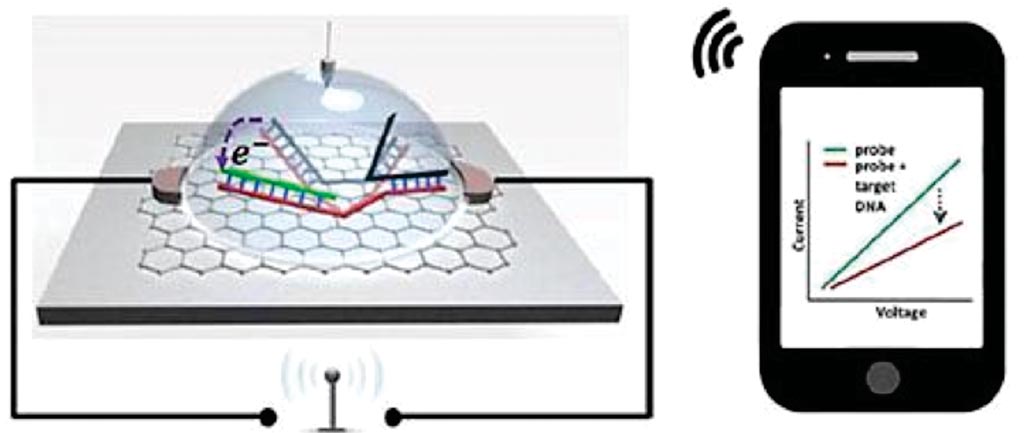Biosensor Chip Detects SNPs with Higher Sensitivity
By LabMedica International staff writers
Posted on 24 Jul 2018
A single nucleotide polymorphism (SNP) is the change in a single nucleotide base (A, C, G or T) in the DNA sequence and it is the most common type of genetic mutation. While most SNPs have no discernible effect on health, some are associated with increased risk of developing pathological conditions such as cancer, diabetes, heart disease, neurodegenerative disorders, autoimmune and inflammatory diseases.Posted on 24 Jul 2018
Electronic DNA‐biosensor with a single nucleotide resolution capability is highly desirable for personalized medicine. However, existing DNA‐biosensors, especially SNP detection systems, have poor sensitivity and specificity and lack real‐time wireless data transmission. DNA‐tweezers with graphene field effect transistor (FET) have been used for SNP detection and data are transmitted wirelessly for analysis.

Image: An illustration of graphene-based single nucleotide polymorphism (SNP) detection chip wirelessly transmitting signal to a smartphone (Photo courtesy of Professor Ratnesh Lal, PhD).
Scientists at the University of California San Diego (La Jolla, CA, USA) have developed a chip that can detect a type of genetic mutation known as a single nucleotide polymorphism (SNP) and send the results in real time to a smartphone, computer, or other electronic device. The chip is at least 1,000 times more sensitive at detecting an SNP than current technology. The chip essentially captures a strand of DNA containing a specific SNP mutation and then produces an electrical signal that is sent wirelessly to a mobile device.
The device consists of a graphene field effect transistor with a specially engineered piece of double stranded DNA attached to the surface. This piece of DNA is bent near the middle and shaped like a pair of tweezers. One side of these so-called "DNA-tweezers" codes for a specific SNP. Whenever a DNA strand with that SNP approaches, it binds to that side of the DNA-tweezers, opening them up and creating a change in electrical current that is detected by the graphene field effect transistor.
What makes the new chip so sensitive is the design of the DNA-tweezers. When the SNP-containing strand binds, it opens up the DNA-tweezers, changing their geometry so that they become almost parallel to the graphene surface. This brings the net electric charge of the DNA close to the graphene surface, giving a larger signal. In contrast, the DNA probe built into the previous chip has a structure that cannot be brought closer to the graphene surface, so it generates a weaker signal upon binding an SNP-containing strand.
Ratnesh Lal, PhD, a professor of bioengineering, mechanical engineering and materials science, and senior author of the study, said, “Miniaturized chip-based electrical detection of DNA could enable in-field and on-demand detection of specific DNA sequences and polymorphisms for timely diagnosis or prognosis of pending health crises, including viral and bacterial infection-based epidemics.” The study was published on July 9, 2018, in the journal Advanced Materials.
Related Links:
University of California San Diego













